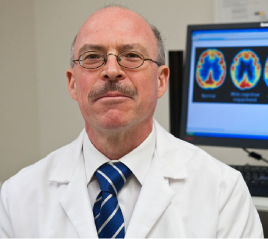A nationwide study being conducted by Georgetown University neurologist R. Scott Turner, MD, PhD, has unexpectedly discovered that a large proportion of participants have previously undiagnosed glucose intolerance, even after patients already under a doctor’s care and those with known diabetes were excluded.
As he began enrolling people with mild to moderate Alzheimer’s disease (AD) as study participants last year, Dr. Turner says he expected to find only a handful of participants with undiagnosed glucose intolerance, but he says he was shocked by how many study participants were found to have this pre-diabetic condition — a finding that opened up a new array important questions.
Dr. Turner’s study examines resveratrol, (3,5,4′-trihydroxy-trans-stilbene) a type of natural phenol, found in the skin of red grapes, blueberries, raspberries, and mulberries and in red wine, to determine if it might effect a change glucose levels in patients with mild to moderate Alzheimer’s disease. He notes that resveratrol is thought to act on proteins in the brain in a way that mimics effects of a low-calorie diet.
“We know from animal studies that caloric restriction prevents diseases of aging such as diabetes and Alzheimer’s,” explains Dr. Turner, in a Georgetown release. Dr. Turner is director of the Georgetown University Medical Centers Memory Disorders Program, which has an interdisciplinary staff of neurologists, nurse practitioners, a neuropsychologist, as well as research faculty and staff, who work together to provide quality care to patients and their families. “On the flip side of the coin, having diabetes increases ones risk of developing AD. So perhaps by improving glucose tolerance, we will prevent or delay both diabetes and Alzheimer’s.”
Photo Caption: The Georgetown University Memory Disorders Program is dedicated to providing state-of-the-art clinical services for individuals affected by Alzheimer’s disease and related disorders and to conducting research aimed at improving treatment options for Alzheimer’s disease – Photo Credit: Georgetown University

To be accepted as participants in the resveratrol study, candidates were first given a fasting glucose tolerance test in order to determine a baseline level. They were then retested two hours after eating. During digestion, blood sugar level increases, and the pancreas accordingly produces insulin to lower it. A continued high sugar level after two hours reveals glucose intolerance (pre-diabetes) or actual diabetes if the level is very high.
“The number of people with glucose intolerance (pre-diabetes) was much higher than expected,” says Dr. Turner. “I was surprised by how many people didn’t know they were pre-diabetic, and these are individuals who already get the best medical care.”
Five (4 percent) of 128 study candidates had impaired fasting glucose levels while three others (2 percent) tested with levels consistent with full-blown type 2 diabetes mellitus. Of the 125 subjects who completed the two-hour test, 38 (30 percent) demonstrated glucose intolerance while another 16 (13 percent) produced test results consistent with diabetes. All told, overall prevalence of impaired glucose tolerance or diabetes at two hours was 43 percent or nearly half of the recruited study candidate cohort.
“How does glucose intolerance or diabetes lead to AD?” Dr. Turner asks. “Does the inflammation associated with AD trigger glucose intolerance? Or do both events create a vicious cycle of Alzheimer’s and glucose intolerance?”
Dr. Turner’s reservatrol study isn’t designed to answer those questions, but it might provide some important clues. He observes that while glucose tolerance testing is not typically ordered by neurologists, his discovery suggests that perhaps all patients presenting with early onset Alzheimer’s should be routinely tested for glucose intolerance, since the test is simple, inexpensive, and could reveal critical health information.
He is researching whether glucose intolerance or diabetes leads to Alzheimer’s disease, if the inflammation associated with AD triggers glucose intolerance and if a vicious cycle of Alzheimer’s and glucose intolerance exists.
Dr. Turner will discuss his findings at the Alzheimer’s Association International Congress in Boston on July 14.
The resveratrol study is sponsored by the Alzheimer’s Disease Cooperative Study through a grant from the National Institute on Aging.
Sources:
Georgetown University
Wikipedia
Image Credits:
Georgetown University


